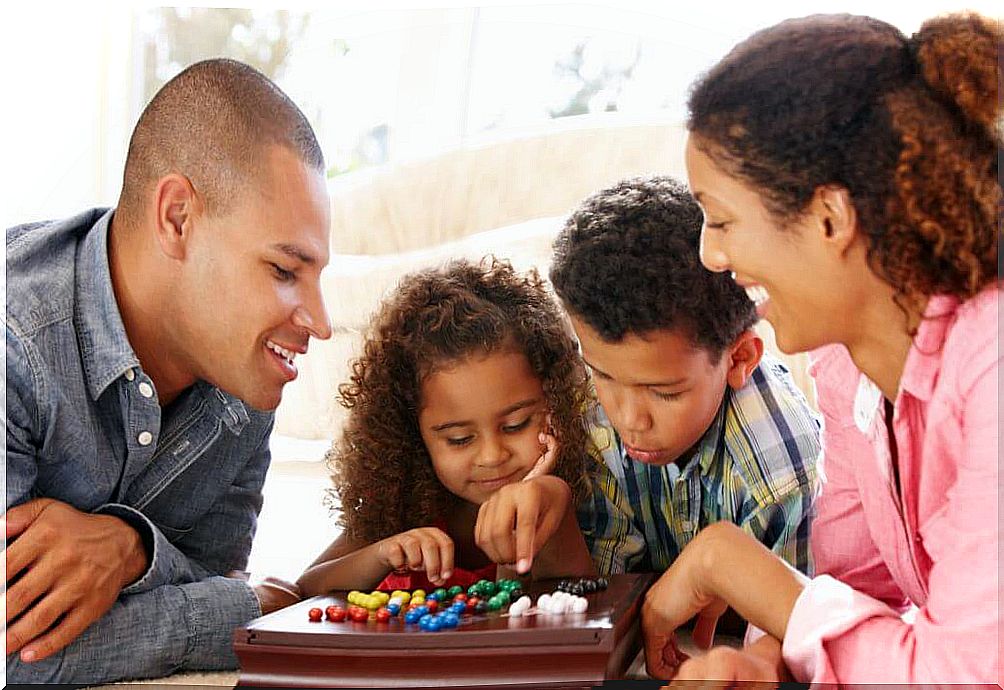5 Levels Of Communication With Our Children
The communication with our children must be part of our daily lives. At some point, differences of opinion or criteria will arise. It is there when communication tools should be used to maintain an assertive dialogue.
Communication is not just talking or repeating warnings to our children. It is also a way of exchanging points of view and, depending on the issue at hand, it can serve as a connecting channel between interlocutors.
There is no link without communication; hence the tremendous importance of talking and sharing. And we don’t mean just a few trades numbered. Communication should be one of the fundamental values in the home.
Of course, by communication we do not refer only to the linguistic aspect. It must also be accompanied by gestures, displays of affection and affection, etc. Communication is verbal and non-verbal.
Good communication with our children

It is not surprising the appearance of conflicts between family members. These are part of interpersonal relationships. But the important thing is to learn to mediate to prevent conflicts from becoming part of the family routine.
Conflicts not resolved assertively can turn into heated arguments, most of them, with an uncontrolled emotional charge. This promotes the clash of egos with devastating consequences.
It is very important to cultivate good family relationships. The most suitable way is to strengthen the communication channels with our children and partner.
As parents we must strive to transmit a calm and respectful attitude when dealing with other members of the family. Coexistence usually brings with it discussions that, in most cases, are due to misunderstandings.
Learn the 5 levels of communication
To make use of the resources and tools that good communication offers us, we must know and understand the various levels of it. In addition, at the moment of reaching the deepest level you will be able to share values, feelings and those intimate aspects that we do not usually talk about with anyone.
Deep communication usually requires certain skills to reach its maximum expression, among them we can highlight:
- Know how to listen
- Know how to identify our feelings and needs
- Have empathy
- Self-knowledge
- Know and understand the needs of the other
However, communication with our children can take place at 5 levels of depth, each with its respective benefits for a healthy family and interpersonal relationship.
Level 1. Talk about superficial things

This level usually deals with trivial topics such as your child’s performance in a soccer game, homework, or what you will eat for dinner. It does not involve relevant information that requires a deep analysis or interpretation on the part of the interlocutors.
Level 2. Talk about other people
It refers to communication with our children about people in their environment, be it their friends, schoolmates or neighbors. It is a level that deals with impersonal conversations that serve to get to know each other better by interpreting what they say to each other, involving other people outside the parent-child relationship.
Level 3. Talk about us
This type of conversation involves a greater degree of mutual knowledge. Here we approach in an affective way and express some kind of experience lived during our childhood or what happened to us at work.
For their part, our children talk about their favorite sport or an activity that they liked to do at school. During this communication with our children , the foundations are laid to build family relationships of complicity and intimacy.
In this way, the trust that our children need to open up and share their deepest feelings with us will gradually be generated.
Level 4. Talk about own feelings

Here the conversations acquire more intimate features because we express what we feel in reference to some event. In this stage, communication with our children is made up of mutual trust and greater unity.
They can express how they feel about the treatment they receive from their friends. And we can communicate how worried or sad we can be about the illness of a family member. This level makes clear the degree of intimacy between family members.
Level 5. Talk about mutual feelings
This is the deepest level we can go to to have communication with our children. It is not about other people or superfluous matters but about what we feel for each other.
Many parents find it difficult to reach this degree of intimacy and vulnerability, perhaps due to behavior learned from their own parents. However, showing our feelings openly to our children will motivate them to act and consequently open their hearts.
Telling our children that we love them helps to strengthen the relationship, building strong emotional ties between the two. Likewise, we must express our annoyance, if it were the case, or any other feeling that allows generating a relationship of trust between parents and children.









